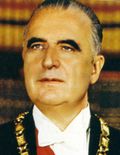 |
Georges-Jean-Raymond Pompidou
b. 5 Jul 1911, Montboudif, Cantal
d. 2 Apr 1974, Paris |
| Title: |
Président de la République (President of the Republic) |
| Term: |
20 Jun 1969 - 2 Apr 1974 |
| Chronology: |
19 Jun 1969,
election to the office of Président de la République is declared upon counting popular votes (cast 15 Jun 1969),
decision of the Constitutional Council (Conseil constitutionnel) of 19 Jun 1969 [1] |
|
20 Jun 1969,
assumed the functions of office, public ceremony, salle des Fêtes, Palais de l'Elysée, Paris [2] |
|
2 Apr 1974, died [3] |
| Other offices: |
Premier ministre (14 Apr 1962 - 10 Jul 1968) |
| Biography: |
| Descended from the family of farmers from the Auvergne; son of a left-leaning but politically uninvolved schoolteacher; attended the Lycée Lapérouse in Albi (Tarn), receiving his baccalauréat; took preparatory courses at the Lycée Pierre-de-Fermat in Toulouse and Lycée Louis-le-Grand in Paris; graduated from the École Normale Supérieure, passing an agrégation examination for professorship in literature (1934); taught at the Lycée Saint-Charles in Marseilles and Lycée Henri-IV in Paris (1935-1944); served in the French army during the Battle of France (1939-1940); returned to teaching at the Lycée Henri-IV; served on the personal staff of Charles de Gaulle as head of mission for national education (1944-1946); served as director of the Commissariat for Tourism (1946-1949); assumed the post of secretary general of the Fondation Anne-de-Gaulle, a charity organization created by the de Gaulle family; was employed by the Rothschild frères bank where he became general manager (1956-1958, 1959-1962); served as chief of staff during the tenure of de Gaulle as President of the Council of Ministers (1 Jun 1958 - 8 Jan 1959); was appointed a member of the Constitutional Council (1959-1962); participated in the negotiations with National Liberation Front (Front de Libération Nationale), resulting in the signing of the Évian Accords (1962); after the referendum of 1962 which approved the Accords he was appointed Prime Minister (14 Apr 1962 - 10 Jul 1968); was widely regarded as being responsible for the peaceful resolution of the student uprising of 1968; in the presidential election, which followed the resignation of de Gaulle (28 Apr 1969), he was elected on the second ballot; successfully continued the policies of his patron; his presidency witnessed the improvement of relations with the Soviet Union; supported the entrance of the United Kingdom into the European Economic Community; enjoying a stable government headed first by Jacques Chaban-Delmas (20 Jun 1969 - 5 Jul 1972) and then by Pierre Messmer (5 Jul 1972 - 27 May 1974), he strengthened national economy; unexpectedly died of Kahler (Waldenström) disease at his home in Paris. |
| Biographical sources: "Who's Who in France", 11e éd., 1973-1974. |
| Elections: |
| Candidate |
Popular vote (1 Jun 1969) |
Popular vote (15 Jun 1969) |
| registered voters |
29,513,361 |
29,500,334 |
| votes cast |
22,898,960 |
20,311,287 |
| valid votes |
22,603,924 |
19,007,489 |
| absolute majority |
11,301,963 |
9,503,745 |
| Gaston Defferre |
1,133,222 |
- |
| Louis-Fernand Ducatel |
286,447 |
- |
| Jacques Duclos |
4,808,285 |
- |
| Alain Krivine |
239,104 |
- |
| Alain-Émile-Louis-Marie Poher |
5,268,613 |
7,943,118 |
| Georges-Jean-Raymond Pompidou |
10,051,783 |
11,064,371 |
| Michel-Louis-Léon Rocard |
816,470 |
- |
|
| Source of electoral results: JORF - Lois et décrets, No. 129, 4 Jun 1969, p. 5523; JORF - Lois et décrets, No. 143, 20 Jun 1969, p. 6212. |
| |
| [1] |
JORF - Lois et décrets, No. 143, 20 Jun 1969, p. 6212. |
| [2] |
Le Monde, No. 7600, 21 Jun 1969, pp. 1, 24. |
| [3] |
Le Monde, No. 9088, 4 Apr 1974, p. 1. |
|
Image: photograph of François Pages. |

